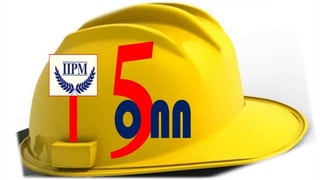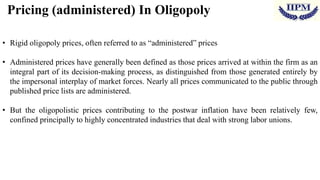This document discusses pricing strategies in oligopolistic markets. It begins by defining key terms like oligopoly and barriers to entry. It then discusses three main models of oligopoly pricing:
1) Cooperative vs non-cooperative behavior, where firms must decide whether to set prices jointly or compete separately.
2) Game theory, which models pricing as a strategic interaction where each firm's best decision depends on the other's actions.
3) Specific models like Cournot competition, where firms choose quantities, and the kinked demand curve model of price leadership.
Real-world examples of oligopolies discussed include airlines and car manufacturers. The document analyzes how various factors influence pricing under imperfect













